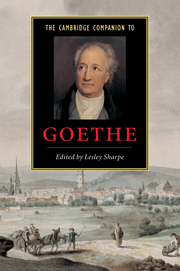Book contents
- Frontmatter
- Introduction
- 1 The world Goethe lived in
- 2 Goethe the writer and literary history
- 3 Goethe the poet
- 4 Goethe the dramatist
- 5 Faust
- 6 Weimar Classicism
- 7 Goethe and the Weimar theatre
- 8 Goethe’s prose fiction
- 9 Autobiographical writings
- 10 In defence of experience
- 11 Goethe and gender
- 12 Goethe and the visual arts
- 13 Goethe and the political world
- 14 Religion and philosophy
- 15 Reception in Germany and abroad
- A guide to further reading
- Index
5 - Faust
Published online by Cambridge University Press: 28 May 2006
- Frontmatter
- Introduction
- 1 The world Goethe lived in
- 2 Goethe the writer and literary history
- 3 Goethe the poet
- 4 Goethe the dramatist
- 5 Faust
- 6 Weimar Classicism
- 7 Goethe and the Weimar theatre
- 8 Goethe’s prose fiction
- 9 Autobiographical writings
- 10 In defence of experience
- 11 Goethe and gender
- 12 Goethe and the visual arts
- 13 Goethe and the political world
- 14 Religion and philosophy
- 15 Reception in Germany and abroad
- A guide to further reading
- Index
Summary
Faust has been seen as the paradigmatic text of modernity almost since its conception. By 1836 Karl Gutzkow was claiming that Goethe was 'set by the gods as a boundary-stone to mark where the past ends and modernity begins', while for Matthew Arnold he was the great manifestation of the modern spirit. Innumerable critics have identified Goethe's most famous work as the beginning of this or that tradition. Whether or not one fully agrees with these characterizations, Faust is undeniably one of those rare works that capture some major turning point in our history. Composed over six decades, from 1773 to 1832, Faust comprehends far-reaching changes in philosophy, science, political and economic organization, industrialization and technology that might best be summarized as Europe's confrontation with the impact of secularization. Europe entered the eighteenth century with institutions and structures still defined in terms of a cosmos ordered by a divine principle; but increasingly the universe was felt to operate on its own and sometimes seemed entirely the product of natural processes.
- Type
- Chapter
- Information
- The Cambridge Companion to Goethe , pp. 84 - 100Publisher: Cambridge University PressPrint publication year: 2002
- 3
- Cited by

